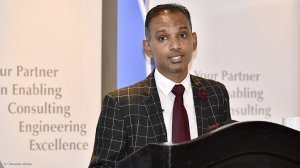Consulting Engineers South Africa (CESA) is calling on government to consider immediately boosting the capacity of State departments and municipalities to plan and execute infrastructure projects by opening the way for an injection of private engineering skills and expertise into the public sector.
In a speech on Wednesday, CESA president Sugen Pillay said such an intervention could help address a long-standing dichotomy in the distribution of infrastructure skills, which were currently heavily skewed in favour of the private sector.
The initiative could also take advantage of the prevailing low utilisation rate of engineering professionals, as reflected in CESA’s most recent survey of its 580 member firms, which pointed to an average capacity utilisation rate of only 80%.
“That means one in five engineers is not currently gainfully employed,” Pillay lamented, while also cautioning that the current decimation of the domestic construction sector risked contaminating upstream components of the construction supply chain.
CESA was convinced that the skills injection could be achieved without breaching procurement rules, either through short-term secondments of engineers, or through the appointment of owner’s engineers at departments and municipalities.
The owner’s engineer could be selected through competitive bidding processes and, once appointed, become a department’s or municipality’s in-house technical unit. Such units would then have the capacity to develop masterplans, engage with external professional teams and contractors and develop a pipeline of bankable economic and social infrastructure projects.
“CESA’s call is that, as a short- to medium-term measure, the capacity that exists within the private sector be utilised to, firstly, capacitate the State, and also to mentor some of the young engineers that are currently employed by the State,” Pillay explained.
The proposal was already being canvassed with government, including through The Presidency’s newly created Investment and Infrastructure Office, headed by former Tshwane Executive Mayor and former Gauteng MEC for Economic Development Dr Kgosientso Ramokgopa.
It also follows a recent admission by President Cyril Ramaphosa that inadequate capacity within government represented the greatest risk to service delivery and the implementation of policy. In fact, he told delegates to the recent Business Economic Indaba that the building of a capable State should have been listed as the number one priority in the list of seven priorities outlined in his June State of the National Address.
Ramaphosa followed this statement up with a January 20 letter in which he said: “A capable state starts with the people who work in it. Officials and managers must possess the right financial and technical skills and other expertise. We are committed to end the practice of poorly qualified individuals being parachuted into positions of authority through political patronage.”
Pillay indicated that government had been receptive to the concept, but warned that the initiative had no chance of success without “political will”.
“This is an intervention that can be implemented almost immediately,” Pillay said, adding that CESA and it member firms, which collectively employed about 21 000 people, were “ready and willing” to support government in implementing its infrastructure programmes.
CESA remained optimistic that the much-vaunted Infrastructure Fund, which is being housed within the Development Bank of Southern Africa (DBSA), would also begin to take shape in the not-too-distant future.
However, Pillay expressed some concern at the fact that R3.5-billion in DBSA funding, which is meant to support infrastructure developments, particularly at a municipal level, was being diverted in support of the business rescue process under way at South African Airways.
Engineering News provided LIVE coverage of the event:
[WATCH] Consulting Engineers South Africa @The_CESA Sugen Pillay speak on CESA's 2020 theme of 'A Time for Reflection, Renewal and Regeneration.' #CESA https://t.co/x3Bt3PePyG
— Engineering News (@EngNewsZA) January 29, 2020
Part2
— Engineering News (@EngNewsZA) January 29, 2020
[WATCH] Consulting Engineers South Africa @The_CESA Sugen Pillay speak on CESA's 2020 theme of 'A Time for Reflection, Renewal and Regeneration.' #CESA https://t.co/ieirQ2intv
Part3
— Engineering News (@EngNewsZA) January 29, 2020
[WATCH] Consulting Engineers South Africa @The_CESA Sugen Pillay speak on CESA's 2020 theme of 'A Time for Reflection, Renewal and Regeneration.' #CESA https://t.co/NSBgjuUTNR
EMAIL THIS ARTICLE SAVE THIS ARTICLE ARTICLE ENQUIRY
To subscribe email subscriptions@creamermedia.co.za or click here
To advertise email advertising@creamermedia.co.za or click here










